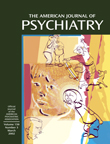Personality Factors Associated With Dissociation: Temperament, Defenses, and Cognitive Schemata
Abstract
OBJECTIVE: The purpose of this study was to investigate temperamental, psychodynamic, and cognitive factors associated with dissociation. METHOD: Fifty-three subjects with DSM-IV-defined depersonalization disorder and 22 healthy comparison subjects were administered the Dissociative Experiences Scale, the Tridimensional Personality Questionnaire, the Defense Style Questionnaire, and the Schema Questionnaire. RESULTS: Subjects with depersonalization disorder demonstrated significantly greater harm-avoidant temperament, immature defenses, and overconnection and disconnection cognitive schemata than comparison subjects. Within the group of subjects with depersonalization disorder, dissociation scores significantly correlated with the same variables. CONCLUSIONS: Particular personality factors may render individuals more vulnerable to dissociative symptoms. Risk factors associated with dissociative disorders merit further study.



